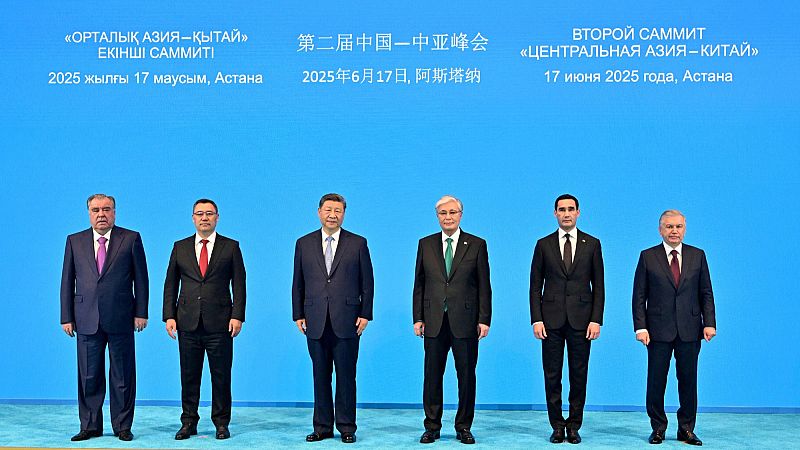
China is increasingly becoming a strategic heavyweight in Central Asia following the second China–Central Asia Summit hosted in Kazakhstan, where the six presidents gathered to discuss future cooperation and signed several agreements.
“I am very pleased to say that relations between Central Asia and China have reached the level of an eternal, ‘all-climate’ and comprehensive strategic partnership,” said Kazakh President Kassym-Jomart Tokayev in his speech.
He noted that last year, China was accountable for about 40% of the region's total foreign trade turnover (€83 billion), almost half of which fell on Kazakhstan.
In turn, President Xi Jinping pledged a generous grant of 1.5 billion yuan (€182 million) for social development projects across the region, which was a strong demonstration of China's soft power.
He and other presidents also signed the Treaty on Eternal Good-Neighbourliness, Friendship and Cooperation, solidifying support for members’ decision-making.
“According to the treaty, the parties … support each other in choosing development paths and models that correspond to their national realities and support each other’s positions on key issues affecting their fundamental interests,” said Sun Weidong, secretary-general of the Summit’s secretariat, in a press statement.
This expression of political synchronicity, paired with the financial pledge, demonstrates how China has firmly established itself in the region.
The summit, or rather talks behind closed doors, will likely have long-standing geopolitical implications. For one, the heads of state in one voice proclaimed the need to support Afghanistan’s development.
“Afghanistan is our close neighbour, we must step up efforts to ensure that Afghanistan embarks on the path of independent development and can achieve peace, stability, recovery and development in the shortest possible time,” said Xi during his speech.
At the same time, the countries condemned the spread of extremism and separatism and vowed to jointly combat them.
Gift or strategic investment?
The ¥1.5 billion development grant comes at a time when Beijing has become not just a lender but also a debt collector across the globe.
According to the Lowy Institute, in 2025 alone, some of the world’s poorest countries will repay a record €19.2 billion to China, shifting Beijing’s role from capital provider to financial drain. Yet, Central Asia seems to warrant exceptional treatment as Beijing deems its land neighbours strategically important.
“Two groups of recipients remain aligned with Beijing’s priorities and have seen resilient lending. The first group comprises strategically or politically significant borrowers,” states Lowy Institute.
While concerns about the sustainability of Chinese debts rise, especially in Kyrgyzstan and Tajikistan, the gratuitous nature of the newly awarded grant underscores the role Central Asia plays in Beijing's eyes.
China gradually overshadows Russia
Central Asia also sees China as a more stable partner, while Moscow’s attention is concentrated on the war in Ukraine. While quietly eclipsing Russia’s once-unrivalled influence, China makes sure that it's on the same page with Russia.
Both countries highlight their cooperation in Central Asia, but the economic scales are tilting.
“Today, they (the leaders) have highlighted the importance of reaching $20 billion (€17.4 billion) of trade turnover between Uzbekistan and China. And we already have a portfolio of investment projects between Uzbekistan and China, which exceeds $60 billion (€52.2 billion),” said Azizbek Urunov, Special Representative of the President of Uzbekistan on WTO issues.
Parallel to that, China is heavily invested in modernising the Middle Corridor and building the long-awaited China–Kyrgyzstan–Uzbekistan railway, both of which bypass Russia. The East Asian country considers these routes economically and strategically logical.
“At the moment, a significant part of bilateral trade is delivered by sea transport. But land transport - rail and road - is also becoming important, primarily for commercial reasons - the time factor plays a role. In this context, it can be said that demand creates supply,” said Xue Fuqi, CGTN columnist.
Beijing has been building its presence in the region for some time, but Russian influence will not be entirely eliminated. Shared historical background, values and language will keep Central Asian countries in close ties with Russia.
What about EU?
The dynamics of great powers seem to be shifting in the region. Once dominated by Russian influence and enjoying ties with the US, it is increasingly realigning with China and the EU, and the 27-member bloc is also stepping up its game.
In April, EU leaders held their own Central Asia summit as part of a broader effort to position themselves as a balancing force in the region.
For Central Asian countries, the EU represents an opportunity to diversify partnerships and reduce dependence on China.
“It’s not only about building a corridor between two regions. It's about the unused opportunities for investment cooperation. Having reliable and advanced partners from Europe is going to benefit in building value-added manufacturing in this region. It's all about employment and export opportunities,” said Urunov.







